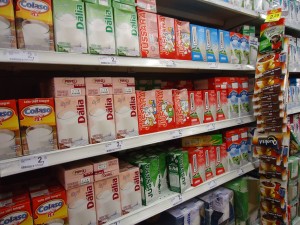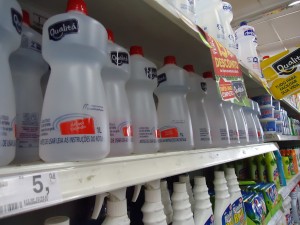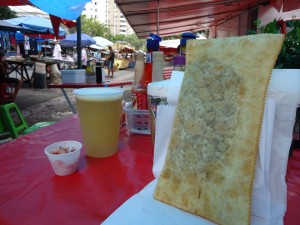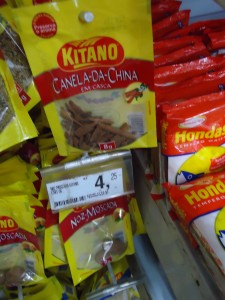
One of the hardest things to do here is grocery shopping. I read a blog post once about how living abroad was like going through adolescents again because you have to re-learn everything. The author must have been thinking about grocery shopping.
Where’s the creme de azedo?
There are three grocery stores within just a few blocks of where we live. Dia is a discount grocery store like Bottom Dollar. The Extra Supermercado is a basic grocery story comparable to Food Lion. Pão de Açúcar is higher-end and more like a Publix. And I don’t go to any of them without my Portuguese dictionary. A usual 15-minute run to the store in the U.S. takes me on average at least an hour here. It helps, though, in learning Portuguese when you have to look up how to say the most basic food items, like cheese (queijo pronounced k-joe), butter (manteiga pronounced mon-te-ga ), milk (leitche pronounced lay-chay) and eggs (ovos pronounced ohh-voos).

You won’t find everything here that is just basic in the U.S., like peanut butter, sour cream and cheddar cheese (though Brazil does have a lot of other high-quality cheese to choose from). However, you improvise. There is a ton of hazelnut spread like Nutella. And, if you get a real craving, there are Wal-Marts and Sam’s Club that typically carry all the U.S. goodies. Just beware, our products are considered imports. So, a can of Campbell’s soup is going to run you about $5.
I also don’t advise you go to the grocery store here when you’re in a hurry. Check out takes forever. There is no rush and even the express lines don’t move that fast. There are also lines reserved for the disabled, elderly, pregnant women, and people with small children. You are expected to bag your own groceries, and it’s highly encouraged to bring your own bags.

My favorite activity in Brazil
There’s a scence in one of my favorite movies, “Under the Tuscan Sun” where Diane Lane’s character is writing about an outdoor market in Italy. “I eat a hot grape from the market, and the violet sweetness breaks open in my mouth. It even smells purple,” she writes. This is feira for me.
The weekdays here end in feira (Monday is segunda-feira, Tuesday is terça-feira, etc.), and each day in a different neighborhood there is an outdoor market set up in a blocked-off street. Everything you could possibly want is available in the freshest vegetables, fruits, meats, eggs, spices, sweets and cheeses. There are also vendors selling clothes, jewelry and kitchen products. Prices are also usually cheaper than the grocery stores.

The feira in our neighborhood is every Wednesday, and I try to go each week even if I don’t need to buy anything just for a lunch of pastels (something like a Hot Pocket) and sugarcane juice (Brazil has the freshest juices you can find). The feira is so colorful with strawberries, melons, oranges, corn, tomatoes, and so much more. The women are bargaining over the cost of a kilo of beans, old men are sampling the ripest peaches, the vendors are calling out to each shopper walking by about their freshest produce, kids are laughing and tugging at your clothes to buy them candy or pastels, and it’s the most wonderful experience.

A Brazil kitchen
In the U.S. we’re spoiled with convenience. You want apple sauce? Buy a jar. You want a spice? McCormick’s has got it for you. Here? You’re going to work for it. Nutmeg comes in its whole form, shredded cheese is mainly a luxury, and you’ll be making your own apple sauce and other cut-up/mashed-up forms of fruit. You are expected to shred, chop, mash and grind yourself.
Whereas the preservatives we have in food back home keeps stuff in the fridge for days to weeks, there are no preservatives here. That means that if you want to have cucumbers in your salad Friday and it’s Monday, wait to buy them.
What product would you miss the most while living abroad? We’ve really missed peanut butter and sour cream.
-Monica

When we were in London, I got a horrible blister on my foot (thankfully, we’d packed moleskin). We went to Boots, like our CVS, and tried to find alcohol, but they didn’t have any either. When I explained what I wanted to the pharmacist (or chemist), he gave me an antiseptic spray. So instead of walking out with band-aids and alcohol, we left with plasters and antiseptic spray. At least from all my years of reading British novels I knew what plasters were… 😉
That’s almost exactly what happened to us, Abby. We went to the pharmacy to find rubbing alcohol for a cut, and left with an antiseptic spray. A friend later told us we would only find alcohol in the cleaning section. That’s interesting to know London is like that, too, as I’m wanting to do a solo trip there. -Monica